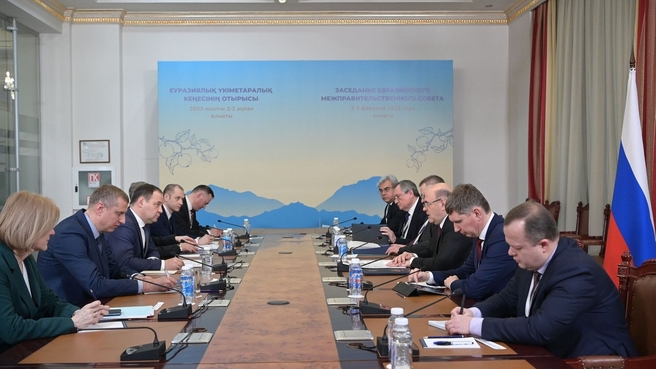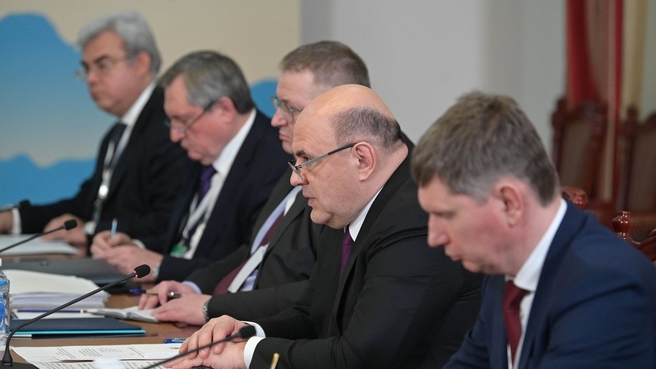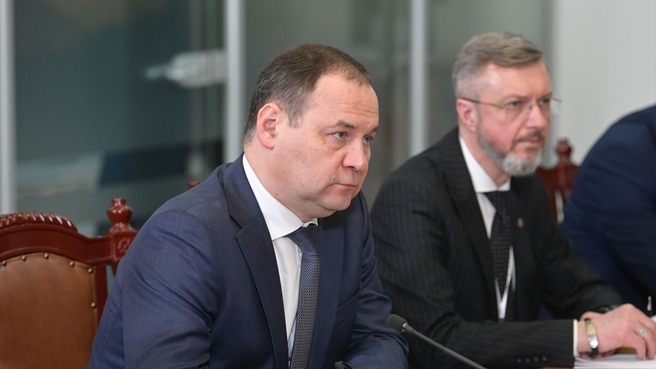The meeting took place on the sidelines of the Eurasian Intergovernmental Council meeting.
Excerpts from the transcript:
Mikhail Mishustin meets with Prime Minister of Belarus Roman Golovchenko
Mikhail Mishustin: Mr Golovchenko, friends. I am happy to see you again. This is our first meeting in 2023. And first of all, I would ask you to convey greetings and best wishes to President of Belarus Alexander Lukashenko from President of Russia Vladimir Putin and from me personally. Last December, in Minsk, the presidents of Russia and Belarus held meaningful, detailed talks on our entire bilateral agenda, discussed key issues of Russian-Belarusian cooperation, and approved important agreements in the fields of energy, industry and transport infrastructure. Of course, the job of our governments is to fulfill what has been set by our leaders.
We prioritise strengthening relations with Belarus in the spirit of friendship, partnership and alliance. Today, we are implementing 28 union programmes approved by the Supreme State Council.
On 1 December 2022, the Interstate Customs Centre began operating in Minsk, and preparations are underway for the creation of a supranational tax committee. We will discuss further integration at a meeting of the Council of Ministers of the Union State, which will soon be held in Moscow.
We are convinced that working closer together on the integration agenda within the framework of the Union State will be an effective response to the illegal sanctions against the Russian Federation and the Republic of Belarus.
Our trade and economic cooperation is developing at a good pace. In January-November last year, our mutual trade rose by 10 percent, to nearly $39 billion. Importantly, Belarusian exports grew ahead of schedule by almost a third (up to $19.6 billion) and for the first time in history exceeded imports from Russia. I think this is a very good development for our Belarusian friends.
We are paying special attention to building up cooperation in industry. You talked about it in detail at a meeting of the Intergovernmental Council in a limited format today. Last November we signed an intergovernmental agreement on the implementation of new joint projects with an integration agenda. They cover such important areas as microelectronics, production of machine tools, machinery and a wide range of other equipment. Our interregional cooperation is of particular importance. The majority of Russian regions work and interact with Belarus, and you, Mr Golovchenko, are actively taking part in it. We know that you have visited Nizhny Novgorod and will soon be going to Ulyanovsk.
And of course I would like to discuss with you our joint trip here today, and I give you the floor, Mr Golovchenko.
Roman Golovchenko: Thank you. Mr Mishustin, members of the delegation, thank you for the opportunity to have this meeting. As always, at the start of a new year we set the tasks that we need to resolve, but first I want to say that I am very impressed by Russia's economic performance in 2022. The gloomy predictions of our enemies have not come true, nor could they. Russia, as always, was at its best, and of course this is a great personal success for you and your entire team. I congratulate you on your great results in a very tough period.
It is also an example of well-coordinated work, well-thought-out and pragmatic decisions. In turn, the Belarusian economy, despite its great vulnerability to external shocks due to its openness, has also demonstrated stability. The foreign trade surplus is secured, foreign direct investment has increased, and the profitability of sales in the economy is above the pre-sanctions level. The labour market remains stable. I believe that the macroeconomic results we have in both Russia and Belarus are largely due to our successful work under the agreements we have in all areas.
Last year was a year with serious tests of strength. Thanks to our hard work, we managed to increase the efficiency of cooperative ties and eliminate a number of obstacles to mutual trade. And of course, as you said, the result was a significant increase in the turnover of goods and services. According to our estimates, in 2022 trade in goods and services will reach about $50 billion, or even more, increasing by over 17 percent.
You correctly mentioned, and I agree, that a major achievement last year was the implementation of important union programmes like the coordination of tax and customs legislation. We have also made progress in creating a legal framework for harmonising the operations of industry. A number of documents have been signed to create a level playing field for competition. We have converted to Russian roubles for most of our commodity transactions. This is further confirmation of Belarus and Russia's commitment to pursue a path of deeper integration and build the Union State based on this.
Today, as you also said, our governments are also focused on implementing the agreements reached by our presidents in Minsk on 5 December last year. Through a coordinated system of cooperation, government bodies are working to implement these agreements. And I want to thank Alexei Overchuk who is supervising this work on the Russian side. In general, the major issues have been resolved, thank you, we appreciate it.
I believe that before the Supreme State Council meeting, we will be able to finally agree on all the outstanding issues and take appropriate decisions to report to our presidents at the Supreme State Council meeting. I believe we can resolve any issues during the Union State Council meeting, which is scheduled for later this month.
Mr Mishustin, I want to emphasise one more thing: with all the many and certainly positive examples of our cooperation, we should not forget about one very important thing – the strategic development of the Union State. Because behind the current issues of finances and trade barriers we are not paying enough attention, at least according to our assessment, to the coordination of the creation of joint strategies for the development of certain sectors, mainly the industries of the future like microelectronics, pharmaceutics, the IT sector, and the motor industry. One of the main tasks we had to address in 2022 within the framework of the Union State was the substitution of critical imports. Over the year, the volume of mutual supplies of such products amounted to about 1.2 billion Belarusian roubles according to our estimates, although in reality, I think the figures are much higher. But we did this as part of anti-crisis or urgent emergency measures. I believe it is necessary to step up our work to coordinate import substitution in addition to the projects that the Russian Federation lends to in the Republic of Belarus. Now 12 specifications have been agreed to, and we are already preparing to start the selection process, with another four being worked out.
I would also like to suggest that we look into and synchronise sectoral import substitution programs. We have analysed the 20 Russian programmes that are available to us, and we see that some of the commodity positions can be covered by Belarusian companies. In the same way, I am sure that Russian producers will be able to seamlessly enter Belarusian import substitution programmes. I am not saying that this is something new, but I just propose stepping up the work in this direction, to coordinate and synchronise it. Of course, we need to move towards joint investment projects in microelectronics, machine tools, and the medical and pharmaceutical industries. These are complicated matters, and we need to decide on producers and on financing and co-financing instruments. We are doing this anyway, but in our opinion, we have to build such a track for ourselves for several years to come. These are complex programmes and, as Vladimir Putin said in his address to us, as part of the EAEU Intergovernmental Council, we must join forces to develop and create advanced scientific and technical solutions in different sectors of the economy. We need to think about how we can translate this message into practical actions.
The synchronisation of scientific research is important, and it is also missing. The key issue now is not only technological independence in terms of production, but also the creation of advanced scientific and technological reserves, so we can use them to do things that will be usable on global scale. This is why it is important to synchronise research and development. I believe these and other related areas should be at the core of the development of the Union State for the upcoming period, 2024-2026. Some of this work is under way now. I propose making this task one of the pivotal ones in these areas. We will talk about this in more detail at the Union State Council of Ministers meeting. I am just anticipating this topic now.














